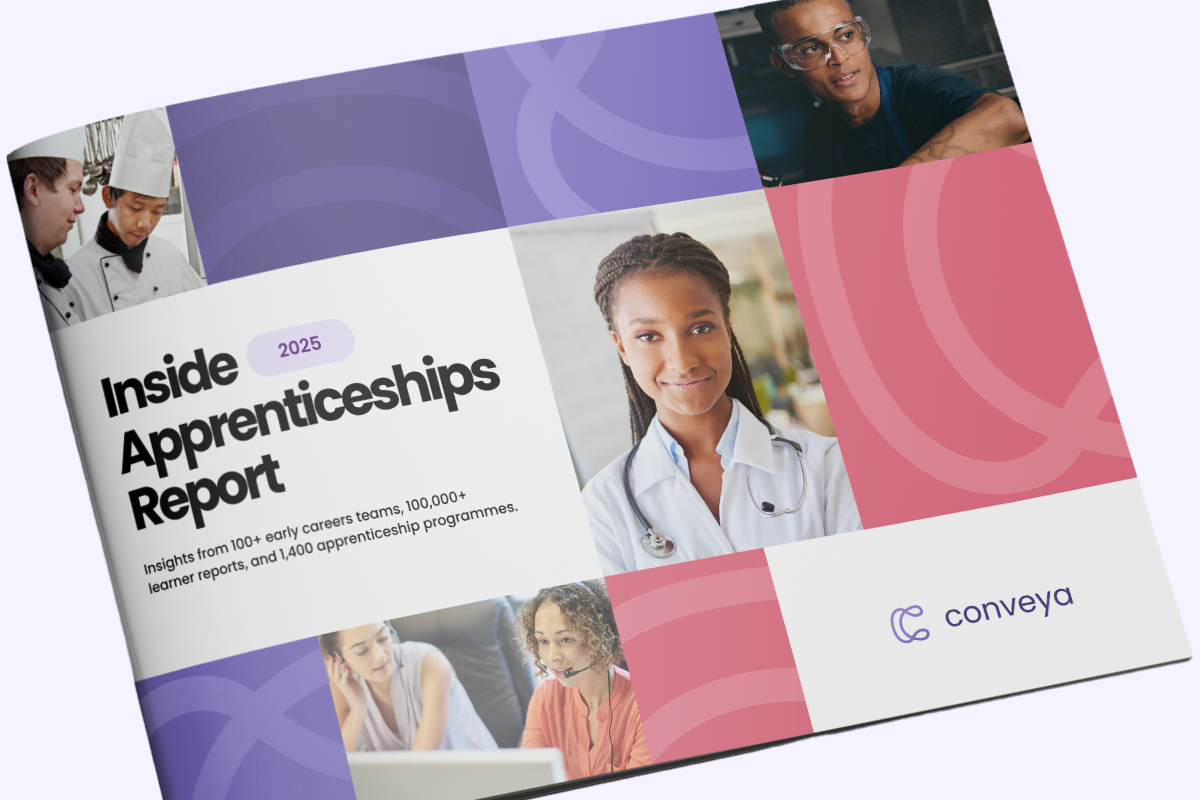Key Takeaways from the Conveya Apprenticeship Employers Seminar
Explore key takeaways on apprenticeship challenges and more from our recent seminar.

Firstly, we’d like to thank our attendees and co-hosts who contributed to the success of our recent Apprenticeship Seminar. Pearson and UCAS played pivotal roles shedding light on apprenticeship challenges and the resources that apprenticeship employers can access.
Here is a high-level overview of the discussions, insights and resources that were shared.
About our speakers
Pearson
Pearson, the UK's largest awarding body, runs highly successful apprenticeship programmes. Their unwavering commitment to placing the learner at the heart of their strategy has resulted in an impressive 100% achievement rate and a 70% distinction rate.

This commitment has earned Pearson Platinum for the "Investors in People: We Invest in Apprentices" award and a third-place ranking in the Top 100 Apprenticeship Employers for 2023/2024.
UCAS
UCAS, a trusted source for millions, is actively advancing education by supporting students in navigating their next steps, whether it be higher education, employment, or apprenticeships.
In collaboration with the Department for Education, UCAS is helping students discover apprenticeships alongside undergrad courses, showcasing the apprenticeship pathway to thousands more young people.
Conveya
Conveya simplifies the employee journey from early careers to leadership. Conveya captures external training progress, provides visibility over learner experiences, and automates reporting for employers globally.
Challenges that apprenticeship employers are facing
The seminar contained roundtable discussions about the challenges that are affecting the management of apprenticeships and the wider early career industry (such as T-Levels). Alongside Pearson, UCAS & some top apprenticeship employers — we came up with various themes and key points for a range of challenges, which we’re sharing with you so that you might consider these when navigating your apprenticeship programmes.
Recruitment Challenges
- Maximising technology for candidate attraction emerged as a key theme.
- Recruitment outreach at age 14 / Year 6 was stated as the best time to start.
- Virtual events are useful for reaching a large audience easily, but physical events remain very important for creating proper connections with prospects.
- Addressing diversity challenges in recruitment remains crucial for shaping inclusive apprenticeship programmes.
Challenges in Retention and EPAO
- Retention and communication with End Point Assessment Organisations (EPAO) demand more attention.
- Ensuring consistency in quality and support for assessors emerged as a priority for creating successful apprenticeships.
Navigating Level 2 Reforms and Data Management
- Employer involvement in Level 2 reforms is essential.
- The strategic use of data for clarity, accountability, and competitive advantage, coupled with the significance of a centralised reporting system, was underscored.
Improving Quality and Transition from T-Levels
- Initiatives to enhance the quality of apprenticeships and strategies for transitioning from T-Levels need more attention.
- The role of data in measuring impact and expressing interest at the beginning of the apprenticeship journey was emphasised.
Pearson's Apprenticeship Success
Pearson discussed their apprenticeships and their use of how quality data within apprenticeships helps the wider business.
Pearson’s apprenticeship philosophy
Pearson shared with us their apprenticeship philosophy, which is that “The learner is at the centre of everything we create” — and this has guided their every decision, initiative and stride they’ve taken.

The result of this philosophy is their learners advance, their business is flourishes, and managers and team members are thrive, which ultimately, is good for their customers.
Pearson’s use of data to enhance their apprenticeships
As we’re shifting into a heavily data-driven world, Pearson isn’t falling behind. They’ve recognised that data is becoming ever more important for them as with Conveya they’re able to access year-on-year trends, allowing them to measure the performance of their programmes against that of the business.
How do they do that? Well, they’ve developed a set of KPIs for their programmes that match the KPIs within their various divisions with a particular focus on DE&I. They explained that data allows them to see where they are against business norms such as recruitment, retention, proportions at each job grade, progressions, promotions and leavers.
With the data, they’re able to prove the value of their programmes in benefitting individuals and their teams.
Pearson’s knowledge and understanding of Level reforms
Pearson shared their insights and understanding of the current level reforms, shedding light on what’s in, what’s out and how these compare across different pathways.
Current reform overview:
- Following the Sainsbury’s Report (2016) T Levels (Level 3) were introduced from 2020 onwards
- Funding for similar qualifications is being phased out as T Levels are being phased in
- 2025 sees the start of new reformed qualifications
- Level 2 reforms are also currently underway for a start in 2025
- Level 1 and below will follow
- Functional Skills and EDSQ already reformed
- GCSEs and A Levels are unaffected by the current reform
Pathway Comparison:
With many changes in qualification pathways in recent years and for the future, Pearson shared a handy comparison chart that shows the number of teaching hours per qualification and the components within these.

UCAS Insights on Apprenticeship Recruitment
UCAS, as a trusted source for millions of students, shared valuable insights into the current state of apprenticeship recruitment. The popularity of apprenticeships is growing, but interestingly enough they’re still not greatly considered by students at the GSCE options stage.
UCAS shared the following statistics that highlight the landscape and emphasise the need for initiatives to bridge the information gap:
- In 2021, approximately 152,000 students expressed interest in apprenticeships.
- This interest witnessed a substantial increase in 2022, with 393,000 students actively exploring apprenticeship opportunities.
- Despite this growth, one in five students closes the door to a potential career in apprenticeships at the GCSE options stage.
- Shockingly, one in three students does not receive information about apprenticeships during their time in school or college.
- A significant perception gap exists, as 87% of students associate university education with securing a good job, while only 57% make the same association with apprenticeships.
- Similarly, 76% of students associate prestige with university education, while only 4% associate prestige with apprenticeships.
- The positive application experience for apprenticeships among 18-24-year-olds stands at 44%, indicating room for improvement.
- Advisers also face challenges, with 94% expressing confidence in supporting university applications compared to only 24% for apprenticeship applications.
It’s evident through UCAS’ research, that more needs to be done to communicate the great qualities that apprenticeships can bring to students still in school.
UCAS Initiatives to Address Challenges

To tackle these challenges and foster a more informed and supportive environment for apprenticeship recruitment, UCAS created a wealth of resources for employers to access:
- Creation of a series of guides providing students with valuable information on career paths after school.
- Robust industry guides explain what students can expect from different industry apprenticeships.
- Launching a new apprenticeship service in Autumn 2023, allowing students to see relevant apprenticeship opportunities alongside degree courses in the UCAS Hub.
- These initiatives aim to increase the visibility and understanding of apprenticeships, enabling students to make informed decisions about their future careers.
Find out more about how employers can recruit apprentices with UCAS.
Conveya’s platform for career development and management

We showcased the next generation of our platform at the seminar, highlighting its role in automating the learner's journey, from supervisor engagement to programme analysis and reporting. With a proud legacy of serving top-tier global employers like Amazon, Pearson, Co-op, and Royal Mail, features like these are improving the efficiency of their programme management:
- Managing a learners journey: Conveya can automate various aspects of a learner's journey from start to finish. Schedule communications & feedback and have complete visibility over a learner's progress. Manage everything from short-term projects to full apprenticeships.
- Programme analysis and reporting: Get an entire 360-degree view of programme performance with the ability to drill right down to the specifics. Discover the data that’s important to you and compare provider performance against each other.
- Engagement & retention: Gather feedback to capture insights and take action quicker. Set alerts on issues that are important to you. Greater visibility over feedback allows you to see trends over time and make comparisons.
- Applying new skills: Digital Logbooks are available on Conveya that streamlines the creation, distribution & reviewing of evidence. Conveya’s logbooks have built-in dashboards that provide greater visibility over the application of on-the-job skills, allowing you to track & encourage learning specific to your industry.
- Supervisor engagement: Conveya is a platform that integrates supervisor input, allowing self-service for departments, HRBP’s or division leads. Managers are given great control over accessibility and visibility options.
If you would be interested in attending future free events in 2024 please let us know.
If you're interested in seeing how Conveya can help your programmes, then you can book yourself a demo here.

.png)


.png)